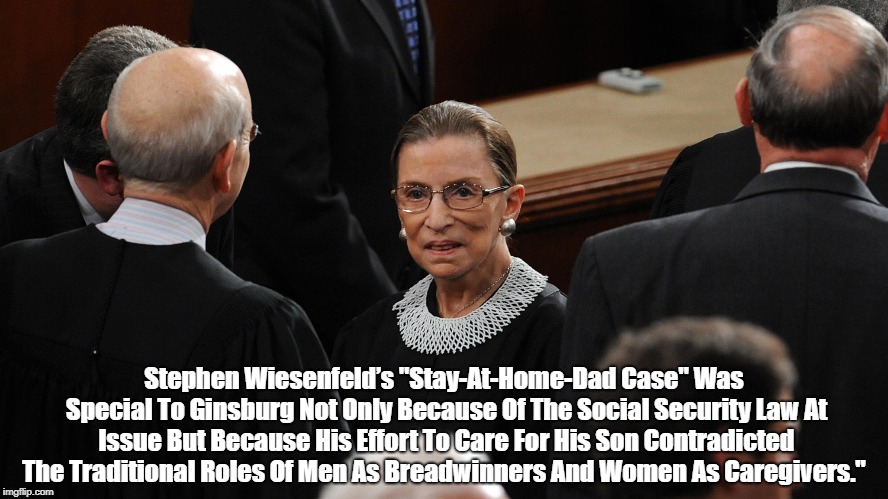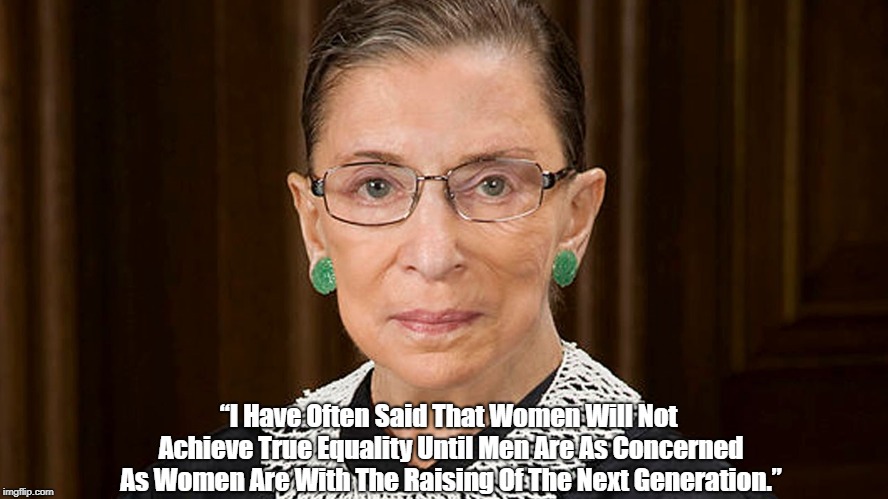
Stephen Wiesenfeld’s first collaboration with Ruth Bader Ginsburg at the Supreme Court was in 1975.
She was a Columbia Law School professor, head of the American Civil Liberties Union’s Women’s Rights Project and making a name for herself as the lawyer systematically prodding the court to rewrite its jurisprudence concerning gender equality.
Wiesenfeld was a young father whose wife had died in childbirth, leaving him with a son he loved and a grievance with his government, which he felt had done him and his family an injustice.
The result of their lawsuit was a unanimous victory for Wiesenfeld and an important link in the landmark chain of cases Ginsburg brought to get rid of laws she felt made irrational distinctions between men and women.
The two met again at the Supreme Court on Saturday, nearly 40 years later. Ginsburg, of course, is now the court’s senior liberal justice.
And Wiesenfeld was a 71-year-old groom.
Ginsburg officiated at Wiesenfeld’s marriage to Elaine Harris in front of family and friends, including Jason Wiesenfeld, the little boy at the center of Weinberger v. Wiesenfeld.
“I’ve kept up over the years with all of them,” Ginsburg said in an interview last week, referring to the clients in the cases she either briefed or argued before the Supreme Court in the 1970s.
There was the Air Force officer who couldn’t get benefits for her husband, though they were available for the wives of male officers. The woman who protested a law that automatically selected a man as executor of an estate. The fraternity members denied the ability to buy beer when women of the same young age were allowed.
She always calls that last one the case of the “thirsty boys.”
The idea behind the cases, she said, was to “confront the justices with real-life situations so that they could understand that what they once thought was a system of weighing benignly in the woman’s favor, in fact disadvantaged them.”
Wiesenfeld’s case was special to Ginsburg not only because of the Social Security law at issue but also because his effort to care for his son contradicted the traditional roles of men as breadwinners and women as caregivers.
“Stephen’s case so moved me,” Ginsburg said. “He was devastated by his wife’s death and he was really determined to bring up Jason himself.”
Wiesenfeld and his wife, Paula Polatschek, married in 1970. She was a teacher before they wed and continued to work afterward. When she got pregnant, they determined she would stay on the job and Stephen would take care of the child.
When Paula died during childbirth on June 5, 1972, Stephen said he did not want to give up his plan for being the one to raise Jason.
He applied for his wife’s Social Security benefits and received a monthly benefit for Jason, but nothing for himself. He found that if he had been a woman who wanted to give up work to take care of her child, the payment to Jason would have been matched.
But there was no provision in the law for fathers.
Seeing a story about inequities in the Social Security program in his local New Jersey newspaper, Wiesenfeld wrote a letter to the editor describing his situation. If eventually found its way to Ginsburg.
“Ruth laid out exactly what would happen” if Wiesenfeld filed suit, and he was eager to do it.
Ginsburg, too, thought it was a great case. There were other challenges to the Social Security system out there, she said, but none with facts as sympathetic as this one. They were, she said, “Wiesenfeld without the baby.”
The case was argued on Jan. 20, 1975 — “She was very forceful,” Wiesenfeld remembers — and decided only two months later.
The court was unanimous, but for different reasons.
Writing for the majority, Justice William J. Brennan Jr. said the law was unfair to women who had contributed to the system.
“Obviously, the notion that men are more likely than women to be the primary supporters of their spouses and children is not entirely without empirical support,” Brennan wrote.
“But such a gender-based generalization cannot suffice to justify the denigration of the efforts of women who do work and whose earnings contribute significantly to their families’ support.”
Two justices said the law was wrong because surviving fathers might have just as great a need for the benefit as surviving mothers. And Justice William H. Rehnquist said the discrimination was against the child, who “should have the opportunity to receive the fulltime attention of the only parent remaining to it.”
“It covered all the bases,” Ginsburg said.
At the time of the ruling, Wiesenfeld said he owned a bicycle shop and made too much money to qualify for the benefit. But he sold the shop, collected the benefit and stayed home with Jason until the boy was into his school years.
Wiesenfeld spoke at Ginsburg’s Supreme Court nomination hearing, and the two correspond. They talk mostly about grandchildren, he said.
Saturday’s ceremony, in fact, was Ginsburg’s second Wiesenfeld nuptial. She presided at Jason Wiesenfeld’s 1998 wedding in Florida, although she needed some help. Ginsburg found that only state judicial officers may preside at weddings in Florida, so a notary public was brought in to make things official.
In the Supreme Court’s ornate East Conference Room, where Stephen Wiesenfeld and Elaine Harris tied the knot, Ginsburg’s authority was not challenged.


For previous High Court columns, go to washingtonpost.com/fedpage.
No comments:
Post a Comment